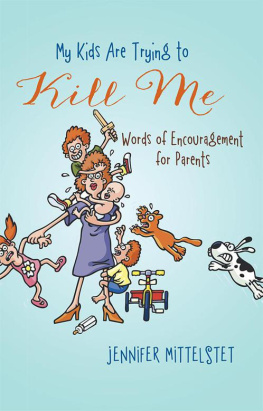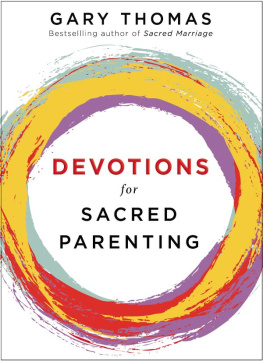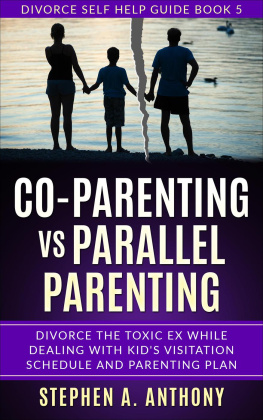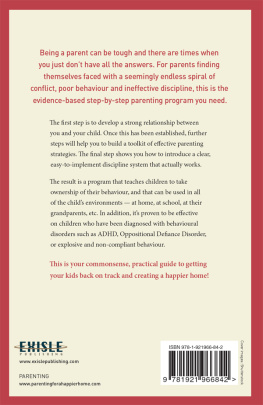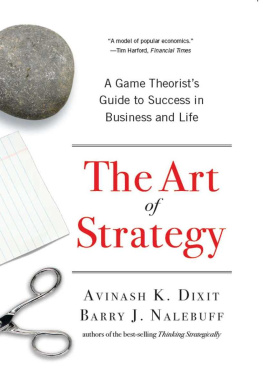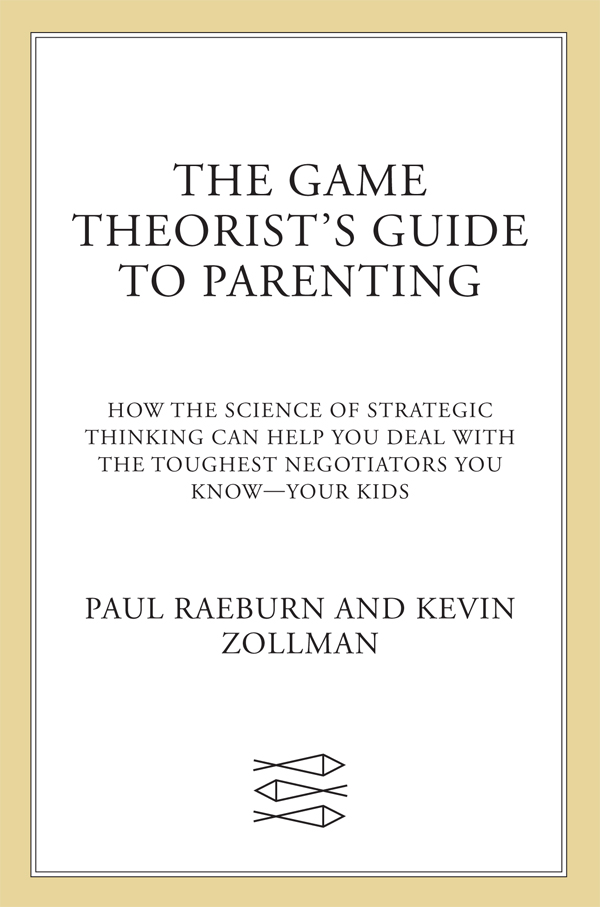Paul Raeburn - The Game Theorist’s Guide to Parenting: How the Science of Strategic Thinking Can Help You Deal with the Toughest Negotiators You Know—Your Kids
Here you can read online Paul Raeburn - The Game Theorist’s Guide to Parenting: How the Science of Strategic Thinking Can Help You Deal with the Toughest Negotiators You Know—Your Kids full text of the book (entire story) in english for free. Download pdf and epub, get meaning, cover and reviews about this ebook. year: 2016, publisher: Scientific American / Farrar, Straus and Giroux, genre: Children. Description of the work, (preface) as well as reviews are available. Best literature library LitArk.com created for fans of good reading and offers a wide selection of genres:
Romance novel
Science fiction
Adventure
Detective
Science
History
Home and family
Prose
Art
Politics
Computer
Non-fiction
Religion
Business
Children
Humor
Choose a favorite category and find really read worthwhile books. Enjoy immersion in the world of imagination, feel the emotions of the characters or learn something new for yourself, make an fascinating discovery.

- Book:The Game Theorist’s Guide to Parenting: How the Science of Strategic Thinking Can Help You Deal with the Toughest Negotiators You Know—Your Kids
- Author:
- Publisher:Scientific American / Farrar, Straus and Giroux
- Genre:
- Year:2016
- Rating:5 / 5
- Favourites:Add to favourites
- Your mark:
The Game Theorist’s Guide to Parenting: How the Science of Strategic Thinking Can Help You Deal with the Toughest Negotiators You Know—Your Kids: summary, description and annotation
We offer to read an annotation, description, summary or preface (depends on what the author of the book "The Game Theorist’s Guide to Parenting: How the Science of Strategic Thinking Can Help You Deal with the Toughest Negotiators You Know—Your Kids" wrote himself). If you haven't found the necessary information about the book — write in the comments, we will try to find it.
I absolutely loved this book, both as a parent and as a nerd. Jessica Lahey, author of The Gift of Failure
As every parent knows, kids are surprisingly clever negotiators. But how can we avoid those all-too-familiar wails of Thats not fair! and You cant make me!? In The Game Theorists Guide to Parenting, the award-winning journalist and father of five Paul Raeburn and the game theorist Kevin Zollman pair up to highlight tactics from the worlds of economics and business that can help parents break the endless cycle of quarrels and ineffective solutions. Raeburn and Zollman show that some of the same strategies successfully applied to big business deals and politicssuch as the Prisoners Dilemma and the Ultimatum Gamecan be used to solve such titanic, age-old parenting problems as dividing up toys, keeping the peace on long car rides, and sticking to homework routines.
Raeburn and Zollman open each chapter with a common parenting dilemma. Then they show how carefully concocted schemes involving bargains and fair incentives can save the day. Through smart case studies of game theory in action, Raeburn and Zollman reveal how parents and children devise strategies, where those strategies go wrong, and what we can do to help raise happy and savvy kids while keeping the rest of the family happy too.
Delightfully witty, refreshingly irreverent, and just a bit Machiavellian, The Game Theorists Guide to Parenting looks past the fads to offer advice you can put into action today.
Paul Raeburn: author's other books
Who wrote The Game Theorist’s Guide to Parenting: How the Science of Strategic Thinking Can Help You Deal with the Toughest Negotiators You Know—Your Kids? Find out the surname, the name of the author of the book and a list of all author's works by series.


